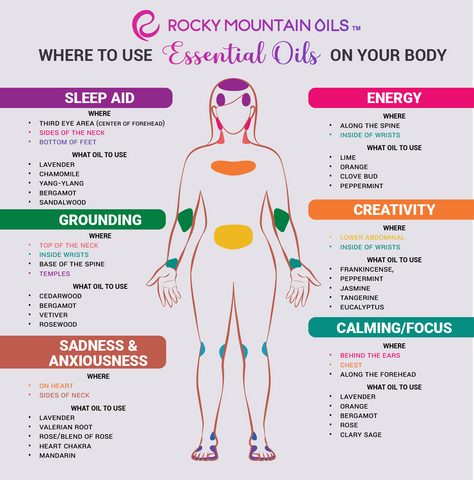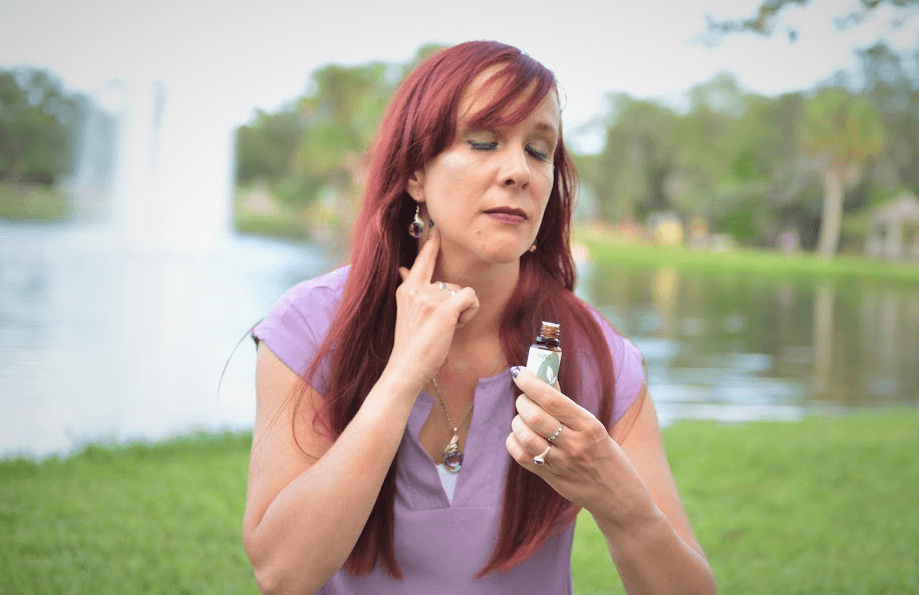Where You Would Put Essential Oils On Your Body?
Essential oils, derived from plants, are not only aromatic but also possess various health and wellness benefits. They have been used for centuries in different cultures for medicinal and health purposes. The wide range of essential oils available, each with its unique properties, can provide relief from stress, aid in relaxation, and even alleviate some physical discomforts.
Understanding the Basics: How Essential Oils Work
Before applying essential oils, it's crucial to understand how they work. When applied to the skin, essential oils are absorbed into the bloodstream, where they can stimulate different areas of the brain, affecting both physical and emotional well-being. The type of oil used, its purity, and the method of application all play significant roles in its effectiveness.
Here is a guide on where to apply essential oils to your body:

Localized Application for Specific Issues
For targeted relief, apply essential oils directly to the area of discomfort. For instance, peppermint oil can be applied to the temples to alleviate headaches, or eucalyptus oil to the chest for respiratory issues. This direct application helps concentrate the oil's effects where they are most needed.
Sensitive Areas: Caution and Care
While some areas of the body are more receptive to oils due to thinner skin, it's vital to proceed with caution. Essential oils should always be diluted with carrier oil before application to sensitive areas like the inner wrists, behind the ears, or the inner thighs. This reduces the risk of irritation or adverse reactions.
Dilution: The Key to Safe Application
It's essential to dilute essential oils with a carrier oil to prevent skin irritation. Carrier oils like coconut, jojoba, or olive oil are not only vital for dilution but also bring their own therapeutic benefits. They can moisturize the skin, enhance absorption, and extend the longevity of the essential oils' effects.
Essential Oils and Massage
Integrating essential oils into massage therapy can enhance the relaxing and therapeutic benefits. A soothing lavender oil massage can aid in relaxation and sleep, while a massage with ginger or black pepper oil can warm and soothe sore muscles.
Foot Soaks: A Relaxing Approach
Adding essential oils to a foot soak can provide a relaxing and therapeutic experience. The soles of the feet are an excellent absorption point for oils, and a warm soak can help in the overall relaxation of the body.
Understanding Pressure Points
Apart from the temples, there are other pressure points on the body where essential oils can be particularly effective. Applying oils to the wrists, palms, or feet can provide quick relief and relaxation. Each pressure point corresponds to different body parts and can be targeted for specific issues.
Essential Oils for Emotional Well-being
Beyond physical benefits, essential oils can significantly impact emotional health. Oils like rose, ylang-ylang, and bergamot are known for their mood-enhancing properties. Applying these oils to the body can help alleviate stress, anxiety, and depression.
Safety and Precautions
It's essential to be aware of the potential risks and side effects of essential oils. Some oils can cause allergic reactions or skin irritation, especially in their concentrated form. Always perform a patch test before widespread use, and consult a healthcare professional if you have any concerns.
Choosing the Right Essential Oils
Quality matters when it comes to essential oils. Opt for pure, high-quality oils from reputable sources. Synthetic or adulterated oils can be less effective and may even cause harm.
FAQs
Navigating the world of essential oils can be both exciting and overwhelming. To help you make the most out of your aromatic journey, we've compiled a list of frequently asked questions. Whether you're curious about choosing the right oil, application techniques, safety concerns, or specific uses, our FAQ section is designed to provide clear, concise answers. Dive in to enhance your understanding and ensure a safe, enjoyable experience with essential oils.
What Are Essential Oils?
- Essential oils are concentrated plant extracts obtained through distillation or mechanical methods, like cold pressing. They capture the plant's scent, flavor, or "essence".
How Do I Choose the Right Essential Oil?
- Choose essential oils based on your needs. For relaxation, consider lavender or chamomile. For energy, look at citrus oils like orange or lemon. Always opt for pure, high-quality oils from reputable sources.
Can Essential Oils Be Applied Directly to the Skin?
- Most essential oils should be diluted with a carrier oil before applying to the skin to prevent irritation. Some oils, like lavender and tea tree, can be used neat (undiluted) in small amounts on specific areas.
What Are Carrier Oils and Which Should I Use?
- Carrier oils are used to dilute essential oils and “carry” them to your skin. Common carrier oils include coconut oil, jojoba oil, and almond oil. Choose based on skin type, allergies, and the therapeutic properties you’re seeking.
Where Should I Apply Essential Oils on My Body?
- Apply oils to areas like the wrists, temples, feet, or over the heart. For specific issues, apply to the affected area, like peppermint oil on the abdomen for digestive discomfort.
Are There Any Risks Associated with Using Essential Oils?
- Essential oils are generally safe when used properly. However, they can cause allergic reactions, skin irritation, or photosensitivity. Always do a patch test before using a new oil and consult a healthcare provider if you have concerns.
Can Essential Oils Be Used in Pregnancy?
- Some essential oils are not recommended during pregnancy. It's important to consult with a healthcare provider before using any essential oils if you are pregnant or breastfeeding.
How Long Do the Effects of Essential Oils Last?
- The effects of essential oils can vary. Typically, the scent of inhaled oils may last a few hours, while topical applications may have longer-lasting therapeutic effects.
Can Children Use Essential Oils?
- Some essential oils are safe for children, but they should be used in a much-diluted form. It’s best to consult with a pediatrician before using essential oils on or around children.
How Should I Store Essential Oils?
- Essential oils should be stored in a cool, dark place in their original containers. Proper storage helps maintain their potency and extends their shelf life.
Remember, the quality of the essential oil and the method of application can greatly influence the experience and benefits. Always refer to the specific instructions provided by the manufacturer and consider consulting with a healthcare provider or an aromatherapy specialist for personalized advice.

